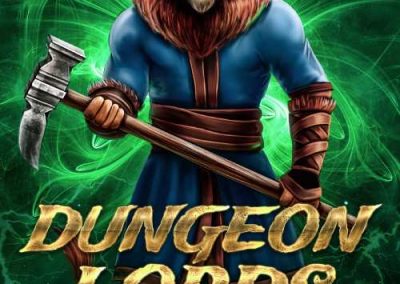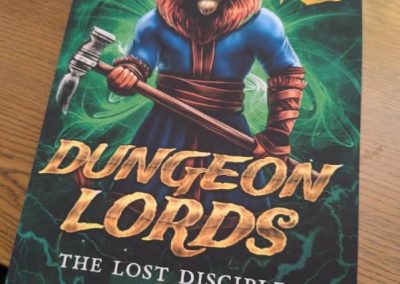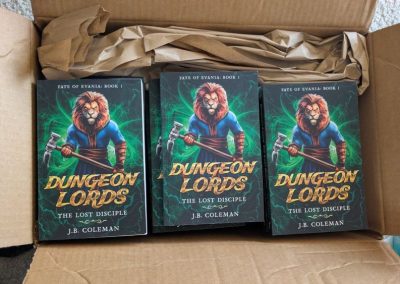Time to Level up
What Is Progression Fantasy?
Why readers relate so much to this genre over almost any other.
It's Progress... without stats!
Progression fantasy is one of the fastest-growing genres in fiction right now, and for good reason. It sits between classic high fantasy and full-stat RPG-inspired grit, built for readers who crave the thrill of watching a character grow stronger, smarter, and more capable over time. But even though the genre is exploding across Royal Road, Kindle Unlimited, and indie shelves, most readers still don’t know how to define it or where to start.
That’s exactly why I’m writing this guide.
As the author of Dungeon Lords: The Lost Disciple, a story rooted in the core elements of progression fantasy, I’ve built an entire world around this concept. My book doesn’t use stats, character sheets, or visible level-ups, but readers still feel every earned milestone as the characters rise from nobodies to world-shakers.
Whether you’re new to the genre or just trying to understand how it differs from LitRPG or power fantasy, this breakdown will give you everything you need.
Let’s dive into what progression fantasy is, how it works, and why it might become your new favorite genre.
What Is Progression Fantasy?
Progression fantasy is a type of story where growth is the core of the experience. Characters start at a low point, often as underdogs or everyday people, and earn their way toward power, mastery, or destiny. In the case of my book it’s towards shaping their fate. Instead of being handed greatness, they fight for it. They train, fail, learn, and improve. You don’t just watch their journey, you grow with them.
Unlike traditional epic fantasy, which often focuses on world-scale conflicts or ancient prophecies, progression fantasy stays grounded in personal development. It also differs from LitRPG, where character stats, level-ups, and interface elements are built into the world. Progression fantasy usually tracks growth through story, struggle, and internal change rather than numbers or rules.
In my book, Dungeon Lords: The Lost Disciple, you won’t find stat blocks or system screens. But you will feel the shift when the party grows stronger, when Faro regains part of his identity, or when a character gains a new skill that reshapes their role. Those moments land because they are earned. They are the result of failure, sacrifice, and effort.
Progression fantasy works because it mirrors something real. You see what can happen when someone refuses to stay weak or lost. That kind of steady climb resonates in a way that sticks with readers long after the final page.
A Brief History of the Genre
Progression fantasy didn’t appear out of nowhere. Its roots run deep in gaming, serialized storytelling, and the slow-burn satisfaction of watching characters earn their power over time.
A lot of the foundation comes from early RPGs. Games like Final Fantasy, Zelda, Shining Force, and Diablo created systems where progress was tied directly to experience. The more battles you fought, the more powerful you became. Growth was tied to action. That sense of forward movement is what made those games addictive. Readers eventually wanted stories that gave them the same feeling.
Writers on sites like Royal Road and later Kindle Unlimited started crafting long-form fantasy where the characters didn’t start strong. Instead, they worked their way up, skill by skill, level by level. Authors like Will Wight (Cradle), Travis Deverell (He Who Fights with Monsters), and Pirate Aba (Mother of Learning) helped shape the genre into something distinct. These stories focused on earned power, not just inherited destiny.
That’s the space where my book lives. Dungeon Lords: The Lost Disciple is fantasy first, but it’s driven by the progression mindset. Characters start with nothing. They earn trust, uncover memories, and grow into the people they shape by making their own fate. It’s a slow build, but that’s what makes the payoffs land. I don’t like books that info dump everything in the beginning, so mine doesn’t do that either.
The genre may have started as a response to gaming, but it has become something bigger — a form of fantasy that rewards patience, effort, and long-term character growth.
LitRPG vs Progression Fantasy: What’s the Difference?
Progression fantasy and LitRPG often get lumped together, and on the surface, they look similar. Both genres center around characters who grow stronger over time. Both feature training, new abilities, and skill advancement. But the way those elements are delivered sets them apart.
LitRPG stands for “Literary Role-Playing Game.” These stories include in-world game mechanics that characters interact with directly. Readers often see stats, levels, experience bars, skill trees, and item descriptions. It’s a blend of storytelling and system tracking. The characters usually know the rules (or figure them out as they go like Dungeon Crawler Carl), and the world treats them like players inside a game.
Progression fantasy, on the other hand, doesn’t rely on visible mechanics. The growth is still there, but it happens through narrative rather than numbers. Characters might not know how strong they are, and they certainly don’t have an interface telling them what their next milestone is. Power comes from surviving, adapting, and pushing forward, not from gaining XP.
A good example of the difference is Dungeon Crawler Carl. That book is pure LitRPG and has brought countless fans into the LitRPG space who never believed they would enjoy reading stats in their story. The characters interact with a game show-style system that tracks every move. It’s fun, sharp, and completely system-driven.
My book, Dungeon Lords: The Lost Disciple, takes a different approach. There are no stats, no menus, no overt rules. But readers still feel the grind. They notice when the characters evolve. They recognize when someone has unlocked a new power or learned a painful lesson. That’s what makes it progression fantasy.
If LitRPG is about tracking power, progression fantasy is about feeling it. The systems may be invisible, but the journey is just as real.
Core Traits of a Great Progression Fantasy
Progression fantasy thrives on momentum. The genre pulls readers in by showing steady, believable growth — not just in strength, but in character, insight, and purpose. Below are the traits that make these stories work.
1. Earned Power
Characters don’t start at the top. They train, fail, recover, and try again. The climb is part of the appeal. Readers stick around because they want to see what happens when effort finally pays off.
2. Tangible Progress
Whether it’s unlocking a skill, defeating a stronger enemy, or gaining new tools, progress is visible. The story doesn’t stall. It moves forward with each chapter. Every win means something.
3. Personal Stakes
Progression isn’t just about strength. The best stories tie it to something deeper: a character’s memory, their identity, or a promise they’re trying to keep. In my book, Dungeon Lords: The Lost Disciple, Faro’s power is directly tied to uncovering who he really is.
4. Clear Goals and Setbacks
The character usually has a clear objective, even if it changes over time. They may want to protect someone, reclaim a legacy, or simply survive. There are moments where they fall short, and those failures matter.
5. Transformation
The character you meet at the beginning is not the same person by the end. In Dungeon Lords, the whole party starts out ordinary. They don’t even have defined roles yet. That’s because I wrote the Fate Core RPG version first, and wanted the story to start out without character classes. That way characters can choose at a defined point later in the story. By the time the story unfolds, they’ve become the fighter, the archer, the healer, and the beastmaster. Getting classes is a fun moment in the book I hope you discover for yourself.
6. Long-Form Storytelling
Progression fantasy usually works best over many chapters or books. The arcs take time, and that slow build makes the turning points feel earned. It’s the difference between being told someone is powerful and watching them become powerful. My series has six planned novels, with other spinoffs in the works.
A great progression fantasy doesn’t rely on spectacle alone. It pulls readers forward with the promise that something better is always just ahead, if the characters are willing to fight for it.
Featured Example – Dungeon Lords: The Lost Disciple
I know I’ve already mentioned my book a few times, but this is where I lay it out clearly in one place. If you’re looking for a grounded, story-driven example of progression fantasy that focuses on character growth without relying on stat sheets or game systems, this is the story I wrote to fill that exact space.
Dungeon Lords: The Lost Disciple follows a lion-man named Faro who stumbles into a mountain village with no memory of who he is or where he came from. At first, he’s treated as a threat. The world is changing, strange creatures are appearing, and the townspeople don’t know what to make of him. But slowly, through battles, visions, and hard choices, Faro begins to remember: and unravel the mysteries of his past, all while gaining strength and identity throughout.
Alongside him, a group of ordinary villagers begin to change. A dwarf bartender, a human tavern maid, a magic-hating healer, and a retired elven hunter are thrust into conflict and forced to rise. By the time they face their first major threat, they’ve become a party, almost a found family, a classic RPG team shaped by the events around them.
There are no floating numbers, no XP trackers, no ability trees. But you feel every level-up in your gut. And that’s the kind of progression fantasy I love to write.
If that sounds like a story you’d enjoy, I humbly invite you to join the adventure.

Why Readers Love Progression Fantasy
Progression fantasy resonates because it’s built on something we all want to believe: that effort leads somewhere. That hard work matters. That if you stay in the fight long enough, you’ll come out stronger.
These stories offer more than magic or battles. They offer a structure that makes growth feel possible. Characters have clear goals. They start with very little. And through discipline, sacrifice, and setbacks, they rise. The journey is messy, but the outcomes are earned. That feeling of seeing someone struggle, learn, and level up scratches something deeper than just entertainment. It’s hopeful.
Readers come back to progression fantasy because it reminds them that improvement isn’t random. It’s built. When characters follow clear objectives and grow in visible, meaningful ways, it reinforces the idea that we can do the same. In real life, we don’t get pop-up messages telling us we’ve gained strength or wisdom, but seeing it happen on the page makes us feel like it’s within reach.
Stories like Dungeon Lords aim to give readers that exact feeling. Faro doesn’t start as a hero. Neither does anyone in the party. But as the story unfolds, you see them earn their place in the world. That steady build, that earned transformation, is what makes progression fantasy so satisfying to write, and even more satisfying to read.

Where to Start Reading Progression Fantasy
If you’re just getting into progression fantasy, it helps to know where to begin. The genre has exploded in recent years, especially through indie authors, Royal Road, and Kindle Unlimited. Some stories lean more into power systems and gamified worlds, while others focus on long-form character development and internal growth. The best ones do both.
Here are a few strong starting points:
Cradle by Will Wight
One of the most widely read series in the genre. Cradle combines a tight magic system with a classic underdog journey as the main character fights through strict social rankings and personal limitations.
Read it here on Amazon.
Mage Errant by John Bierce
Set in a magical academy, this series follows a struggling student who finds an unexpected path to strength through creativity and hard work. The progression feels earned and the world feels real.
Read it here on Amazon.
Mother of Learning by Domagoj Kurmaic (aka Pirate Aba)
A time-loop fantasy where the main character retains skills and knowledge through each cycle. Not your typical progression setup, but one of the best examples of layered development over time.
Read it here on Amazon.
The Wandering Inn by pirateaba
While it flirts with LitRPG, the heart of the story is pure progression. Characters evolve deeply over time, not just in strength but in identity, responsibility, and worldview. It’s long, emotional, and slow-building in the best way.
Read it here on Amazon.
Dungeon Lords: The Lost Disciple by J.B. Coleman
If you want something grounded in classic fantasy but built with the momentum of progression, this is my personal contribution to the genre. It’s low on stats but high on struggle. The growth is woven into the characters and the world itself. Every win is earned. Every transformation matters.
Read it here on Amazon.
There’s no single “right” place to start with progression fantasy. Just look for the kind of journey you want, whether it’s stat-heavy, spiritually charged, or story-first, and dive in.
Subgenres and Variants
Progression fantasy is a flexible genre. While the core concept stays the same — characters getting stronger through effort, there are several subgenres that shift the tone, style, or structure. Knowing the differences can help readers find exactly what they’re looking for.
Cultivation Fantasy
Rooted in Chinese storytelling traditions (xianxia and wuxia), cultivation fantasy focuses on internal energy, spiritual growth, and a ranked path to power. Characters often meditate, absorb energy, or unlock stages of enlightenment. The systems are deep and philosophical, but the essence of progression is still there. It’s just turned inward.
Portal Progression Fantasy
In these stories, the main character is transported from one world to another. Often, the protagonist starts out weak or powerless and must climb their way up in a world with different rules. These stories mix world-building with personal progression, and often blend with isekai or classic portal fantasy.
Villainous Progression
Some progression stories focus on characters who aren’t out to save the world, but to conquer it. These arcs are darker, but still follow the same structure, gaining power piece by piece. In my extended lore, The Revenant’s Tale, the character Cosimir shows how a former disciple can fall into something monstrous through unchecked ambition and the wrong kind of growth.
Party-Based Progression
While many progression stories focus on a single character, some, like Dungeon Lords, center around a full group. The party starts out untrained and unprepared. But through shared conflict, each member grows into a defined role. Fighter. Archer. Healer. Beastmaster. Watching a team level together creates a layered kind of progression that mirrors classic RPGs and feels more communal.
Power Fantasy
This is where progression fantasy draws a clear line. Power fantasy features characters who are already strong, sometimes godlike, from the beginning. These stories are about dominance and display rather than development. There’s nothing wrong with them, but they offer a different experience. Progression fantasy is about the climb. Power fantasy starts at the top.
Why Progression Fantasy Works
Progression fantasy isn’t just a genre. It’s a feeling. It taps into something deeply human, the desire to grow, to improve, to overcome. Readers don’t just want to watch heroes win. They want to watch them become the kind of people who can.
That’s what makes these stories so powerful. Whether it’s a lone fighter clawing their way up through training or a party of misfits discovering who they are under pressure, the arc of growth is what sticks with you. And when done right, it makes you believe that maybe you can level up too.
That’s why I wrote Dungeon Lords: The Lost Disciple. I wanted to create a story where you feel the grind, the climb, and the breakthrough. Where growth isn’t granted but earned, and where ordinary people slowly become something more.
If you’ve never tried progression fantasy before, I hope this guide helped you understand what makes it special. And if you’re ready to experience it for yourself, I invite you to start with my book.
Read the first 5 chapters free
Or grab the full book on Amazon








